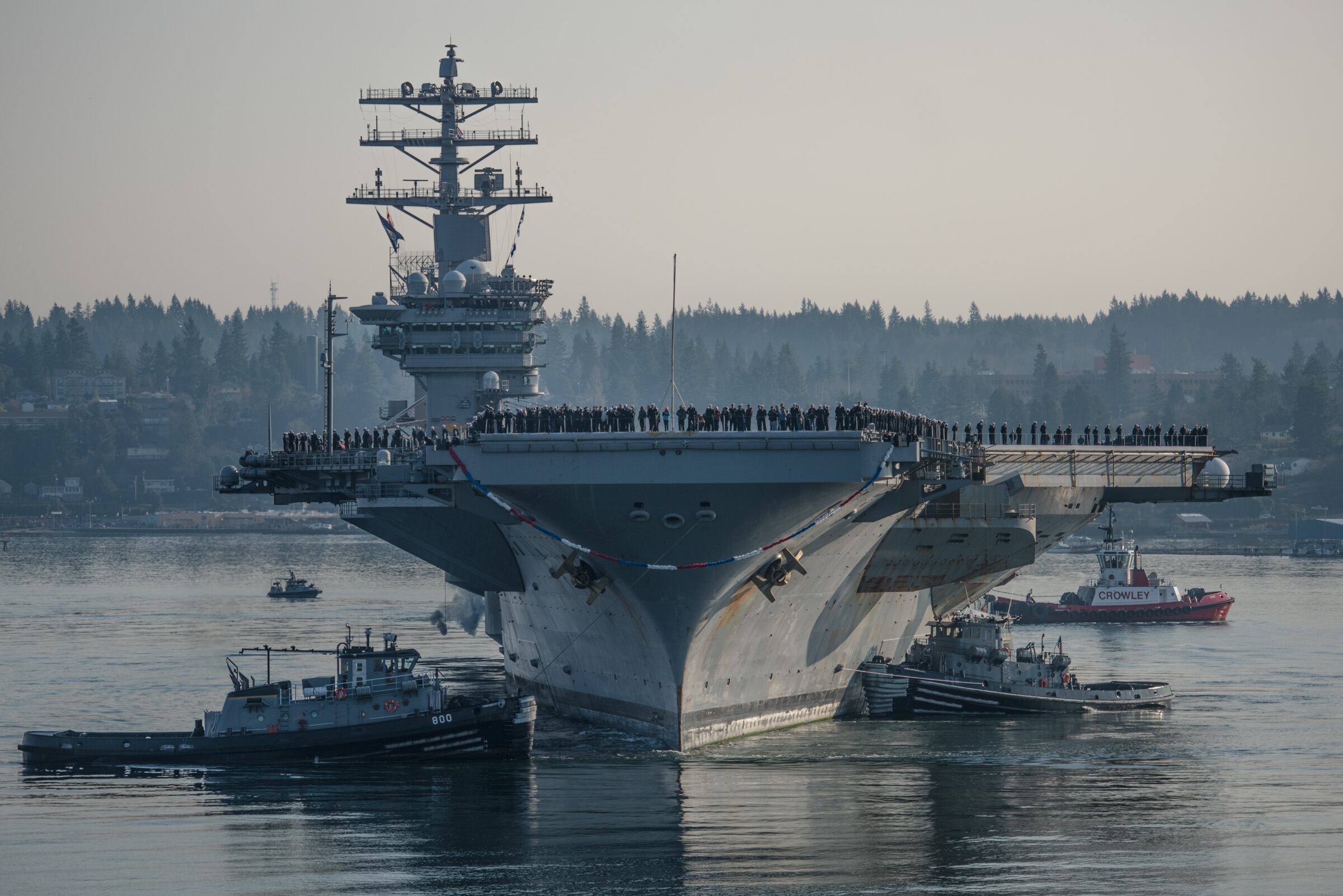WASHINGTON — After years of warnings from U.S. Navy leaders that replacing the aging Ohio-class ballistic missile submarine will eat the service’s shipbuilding account alive, the year the first Columbia-class submarine is to be funded has arrived with the fiscal year 2021 budget request. But according to Secretary of Defense Mark Esper, the Navy shouldn’t expect any extra money to pay for it.
In an exclusive interview with Defense News Friday, Esper said the Columbia class is a Navy bill, just like Air Force nuclear deterrent recapitalization will be an Air Force bill, and the services will just have to find efficiencies in house to pay for it.
“Clearly, the Columbia is a big bill, but it's a big bill we have to pay,” Esper said. “That's the Navy's bill. The Air Force has a bill called bombers and ground-based strategic deterrent, so that's a bill they have to pay.
“We all recognize that. Acting Secretary [Thomas] Modly and I have spoken about this. He believes, and I think he’s absolutely correct, that there are more and more efficiencies to be found within the department, the Navy and the Marine Corps, that they can free up money to invest into ships — into platforms.”
RELATED

The word from Esper that Columbia would be considered a shipbuilding bill seemed to put the final stake in the heart of years of efforts by Navy leaders and lawmakers to avoid crushing the Navy’s shipbuilding budget and negatively impacting other programs such as surface ship construction, ships that provide both a vital peacetime deterrence function and are popular with lawmakers with shipbuilders in their states.
The Navy’s top officer, Chief of Naval Operations Adm. Michael Gilday, recently called for the Defense Department to shift even as little as one percent of the DoD budget to Navy shipbuilding to provide some relief from Columbia, which is a national strategic priority, but Esper said he has to consider the whole force.
“We've got to build the entire, the total force, because we fight as a total force,” Esper said. “One thing that our war gaming and analysis will look at is the total force fight.
“You just don't fight one service. You don't fight the Army, you don't fight the Air Force, you don't fight the Navy, you fight the team, the joint team.”
The first Columbia-class submarine is expected to cost a total of about $8.2 billion, with non-recurring costs included. The remaining 11 ships should cost about $6.2 billion a piece, according to the Congressional Research Service.

A fight brewing in Congress?
But with the Navy expecting to request a third fewer ships in 2021 than they did in 2020, according to a Feb. 6 report in Bloomberg, taking the funding exclusively from the Navy’s shipbuilding account will likely rankle Congress.
In a January 14 letter to Esper and Navy acting Navy Secretary Thomas Modly, obtained by Defense News, the democratic chairman of the House Armed Services Committee’s Seapower and Projection Forces subcommittee Rep. Joe Courtney said the Defense Department needs to reexamine how it intends to pay for Columbia.
Courtney said recent reports that the Navy was planning to cut a Virginia-class submarine, slow down the next generation Frigate and stop buying P-8A Poseiden aircraft seem like the chickens coming home to roost for DoD’s inaction on working with Congress to find a plan to fund Columbia.
"The context in which these proposals are occurring is, of course, the planned start of Construction of the Columbia class submarine," Courtney wrote. "While the program is rightfully our nation's top national security acquisition priority, it appears the Navy will be solely responsible for funding the program out of its Shipbuilding and Conversion, Navy account.
"Absent a significant increase in programmed resources in the SCN account, it is expected that allocating the funds needed to construct the planned fleet of Columbia-class submarines entirely out of the Navy's shipbuilding budget will constrain the service's ability to support the full range of shipbuilding priorities for our nation."
Congress in 2014 created the National Sea-based deterrent fund to address this issue, Courtney wrote; that fund was designed to allow the Defense Department to use money from across the enterprise to fund the Columbia project, not just money from Navy shipbuilding.
Without finding some alternative funding for the Columbia, the Navy estimated that as many as 30 ships would be removed from the shipbuilding plan. Ultimately, the Navy’s long-term mission shouldn’t have to be impacted by something that is a single-mission national asset.
"Given the fact that over 70 percent of the nation's nuclear deterrent will be deployed on Columbia-class submarines for forty years or more, this 'once in a multi-generational' expense should not be disproportionately be borne by one branch of the military," Courtney wrote.
There has been increasing, bipartisan angst from Capitol Hill as it has become increasingly clear DoD intends to cut new ship construction.
RELATED

On February 6, the day news broke that the Navy intended to request 20 percent fewer ships, Republican Sen. Roger Wicker introduced new legislation that would “direct the Navy to start construction on at least 12 Arleigh Burke-class destroyers, 10 Virginia-class submarines, two Columbia-class submarines, three San Antonio-class amphibious ships, one LHA-class amphibious ship, six John Lewis-class fleet oilers, and five guided missile frigates across FY2021-2025,” according to a press release.
Wicker’s SHIPS Implementation Act likewise calls for the department to leverage the National Sea-based Deterrence Fund to ease the burden on shipbuilding. The bill would “recognize the strategic value of the Columbia-class submarine program by authorizing the use of the National Sea Based Deterrence Fund to support the Columbia-class submarine program with funds in addition to the Navy’s shipbuilding budget.”
The bill is about keeping pace with potential adversaries, Wicker said in the release.
“Our nation’s Navy is still the envy of the world, but our adversaries are quickly catching up,” Wicker said. “It is time for Congress to get serious about investing in our fleet and give our sailors and Marines the tools they need to stay ahead of those who wish us harm.”
Aaron Mehta in Washington contributed to this report
David B. Larter was the naval warfare reporter for Defense News.








